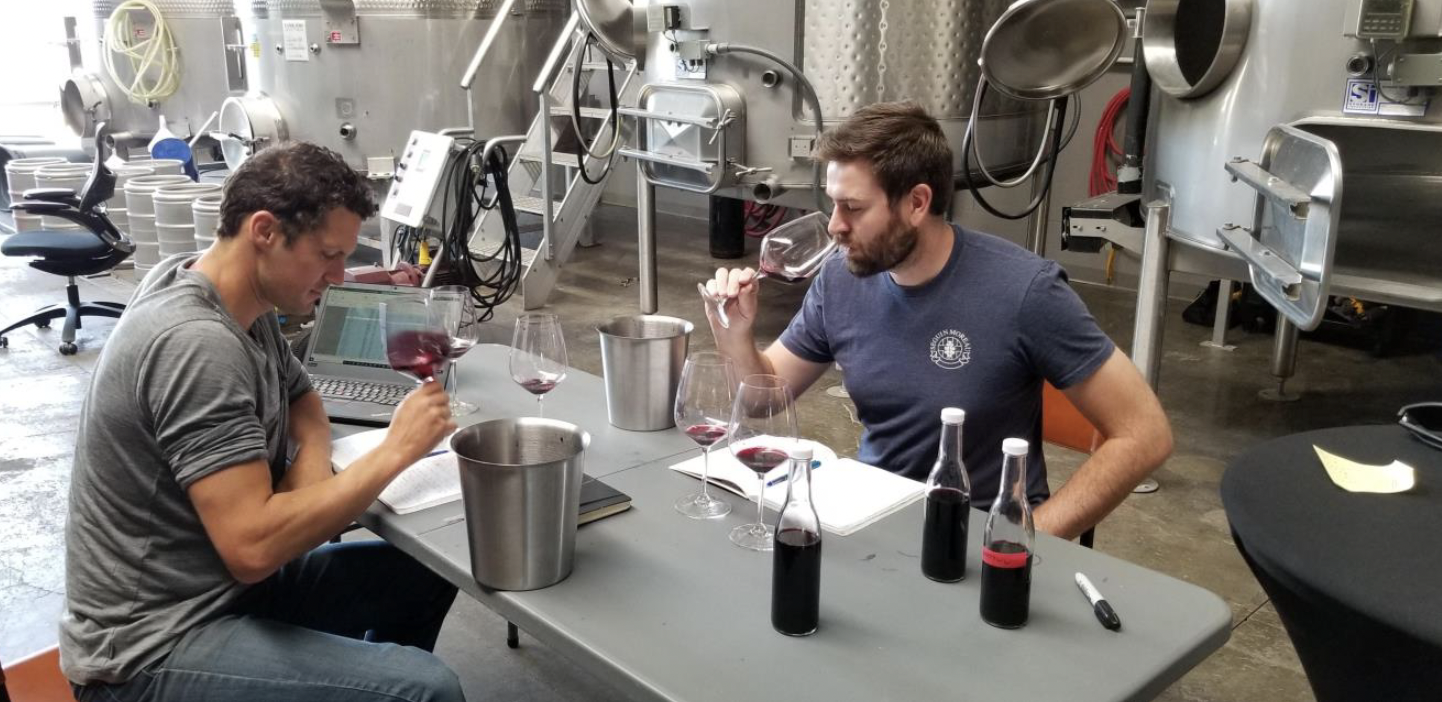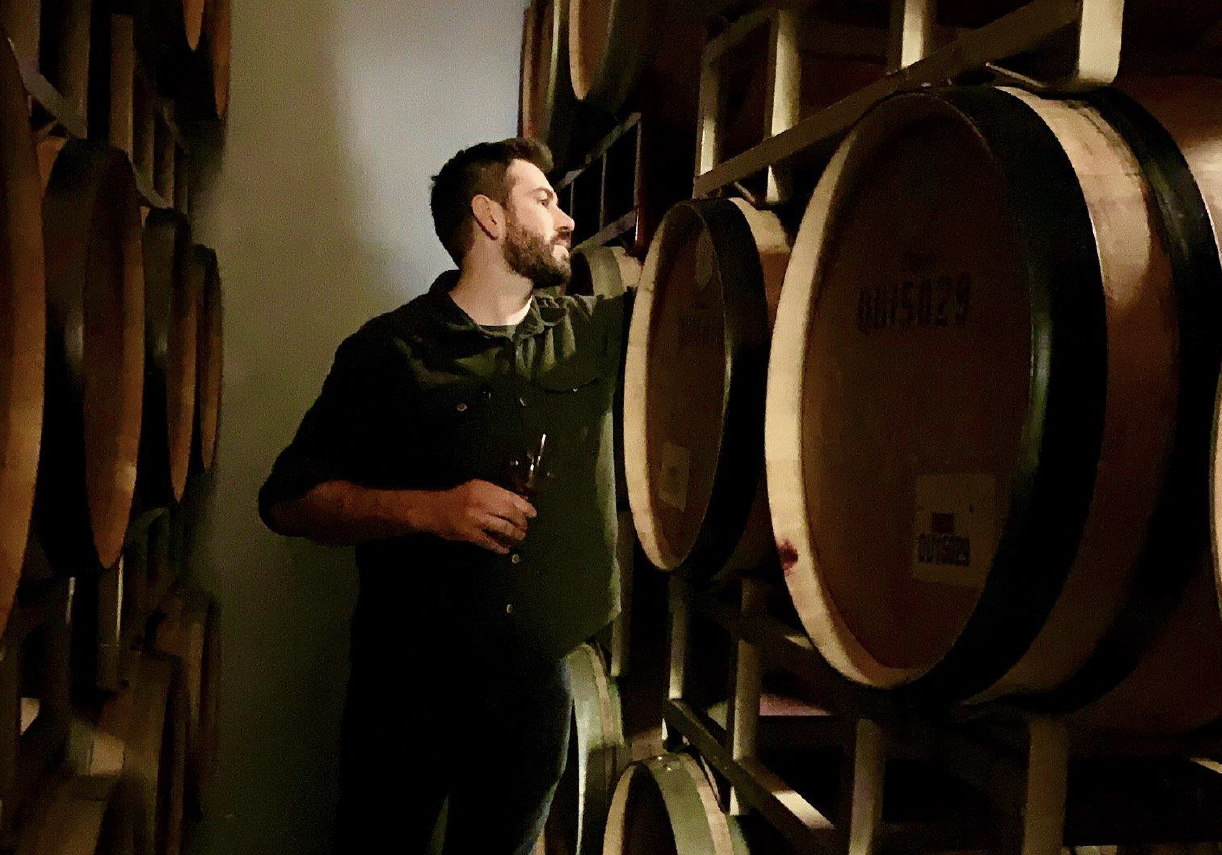Taking Flight: An interview with Joseph Cznary of Canvasback Wines by Michael Matthewson
Mr. Czarny and I managed to find some time last week for a quick chat, which certainly wasn’t easy for him. Joe is currently working as the Assistant Winemaker for Canvasback winery in Walla Walla, Washington. Aside from all the work he puts in at the winery throughout the week he has been working hard along with his wife to prepare their new home for their soon-to-be baby girl. He and Kristina Czarny, a fellow Institute of Enology and Viticulture graduate, have both been working their respective wine industry jobs (hers at Waterbrook Winery as Enologist) and preparing for a new chapter in their lives. They could not be more excited, and I was very pleased to get to speak with Joe on the verge of such a big moment in his life. Down-to-Earth and humble, Joe and Kristina are both excellent people, great additions to our local wine community, and a great team.

MM: How did you get into wine?
JC: I kind of fell into wine. I was working a machine shop job that I hated in Arizona. There were no windows in the building and no job satisfaction. My aunt and uncle were visiting my folks in Arizona and I stopped by to say hello with a bottle of Chateau Ste. Michelle Syrah, which was fortuitous as it turned out (since it was Washington wine that lead the conversation). My aunt was teaching at Walla Walla Community College at the time and mentioned the Enology & Viticulture program at the school. I was intrigued and after looking into the program and the many potential jobs that could come from it, I decided to apply. I got accepted into the program and moved to Walla Walla to see if I liked this industry. Fortunately, I love the industry and all aspects of winemaking, and I intend to stay in Walla Walla for the foreseeable future.
MM: Is there someone in the EV world that you admire, including fellow EV alums?
JC: I have quite a long list of former Enology and Viticulture people that I admire working throughout the valley. I have always had massive respect for Tim Donahue (former Director of Winemaking at College Cellars turned independent wine consultant). He introduced me to the world of wine and made it seem accessible and exciting. Peter Devison of Devison Vintners makes artful wines that are delicious, I admire his pursuit of perfection in his work. I applaud Fiona Mak for her ambition to start a winery that produces exclusively rosé and the many different styles of wine that it can make. I admire Ashley Trout for her skill as a winemaker and her humanitarian endeavors with her non-profit label Vital, aside from her excellent wines at Brook and Bull. I am thankful to Brian Rudin for taking me under his wing and giving me better insight into the world of winemaking and expanding my knowledge from what I had picked up through the EV program and several years of cellar work.
MM: What’s special to you about working in the wine industry?
JC: Firstly, I find that turning grapes picked from the vineyard into a beautiful wine is astounding and humbling. I am lucky to be part of an industry that has been in practice since the earliest civilizations millennia ago, carried down through the generations until I too could be part of the grand tradition. Secondly, the winemaking community is an extremely special one. The Walla Walla Valley in particular has a wonderful attitude and approach to winemaking and winery appreciation. Some of the other valleys no longer have the kind of comradery that we enjoy here in Walla Walla.
MM: What is your favorite part of your job?
JC: My two absolute favorite parts of my job are blending sessions and barrel trial tasting. When you work mostly in custom crush, these sessions are your opportunity to refine the wines that you have worked so hard on and expand and train your palate. Barrel trials allow us to stay in touch with which barrel choices are working with our wines and find which barrels need to be removed. I also enjoy getting the chance to drive forklift and top the wines. Another symptom of custom crush winemaking is that I don’t get to get my hands dirty as often I would like to. I love taking care of our wines in storage: topping, sulfuring, testing, etc. Doing these tasks helps keep some of my cellar skills sharp and to disconnect from other worries and concerns and just be focused on the wine, which is what it’s all about.
MM: What are some of the challenges you’ve faced in the industry?
JC: There are certainly unique challenges every harvest. The biggest challenge lately has been dealing with smoke taint in some of the wine and the hesitancy to talk about it in public. It’s certainly something we need to be discussing in order to find solutions going forward. Fortunately, I haven’t had any personal challenges that have affected me in our industry.
MM: What do you think differentiates and excites you about Washington wine?
JC: Definitely the diversity in what we can make well. There are not many places where you can get anything from a great representation of Austrian/Alsatian Riesling, to profoundly powerful Cabernet Sauvignon, to a uniquely earthy and terroir driven Syrah. Usually, you would have to travel all around Europe or to several states for that kind of diversity, and we have all of it here in Washington. I also enjoy that Washington wines can toe the line between new and old-world wines. Our wines can evoke the same depth of structure, purity of fruit, and terroir driven elements that are found in many old-world wines well established in place and style. This is especially true of older Washington wines.
MM: How do you foresee climate change or social issues affecting the local industry in the next few years?
JC: I think we have seen the effects of climate change already with earlier and more intense fire seasons. I believe that climate change will also bring harvest dates earlier and earlier. We see it in hotter years like this last one, where fruit that is usually brought in mid-September is ready to go in late August. We saw a lot of fruit come in a full month earlier than usual this last year. I don’t know of any major social issues going on locally. We are a fairly inclusive wine region, and we have all proven that a pandemic won’t stop us from making and selling delicious wine, or consumers from buying it.
MM: What are some up-and-coming trends in wine that you’re following?
JC: Oh boy, I am not a trendy person. Especially when those trends are natural wines and pet nats (petillant naturel). I have enjoyed seeing some lighter reds popping up here and there and am excited by the push for more sparkling wine in the area (and in general). On the production side I have been using a software called Wine Xray that allows Brian and I to see extraction data like free and bound anthocyanins, total phenolics, perceptible tannin, and more on a daily basis during harvest. It is a very useful tool for helping us to make daily fermentation decisions.
MM: What advice can you share with future EV graduates?
JC: I remember the first advice that I got from a winemaker. As he poured me a taste of his wine into a dirty glass he pulled from behind the bar he told me plainly to get out of the industry. “The market is too saturated already and there’s no room for any more wineries or winemakers.” Thankfully, I think he’s been proven wrong as new successful wineries are started every year. My advice would be to pay attention, learn all you can, make new friends, and establish a solid network of fellow industry peers to lean on. Be generous with your abilities and resources. Generic, I know, but sound advice, I think. This industry has been built by people who have good ideas, the resources to make it happen, and people around them to lend support when needed.


Join the Conversation